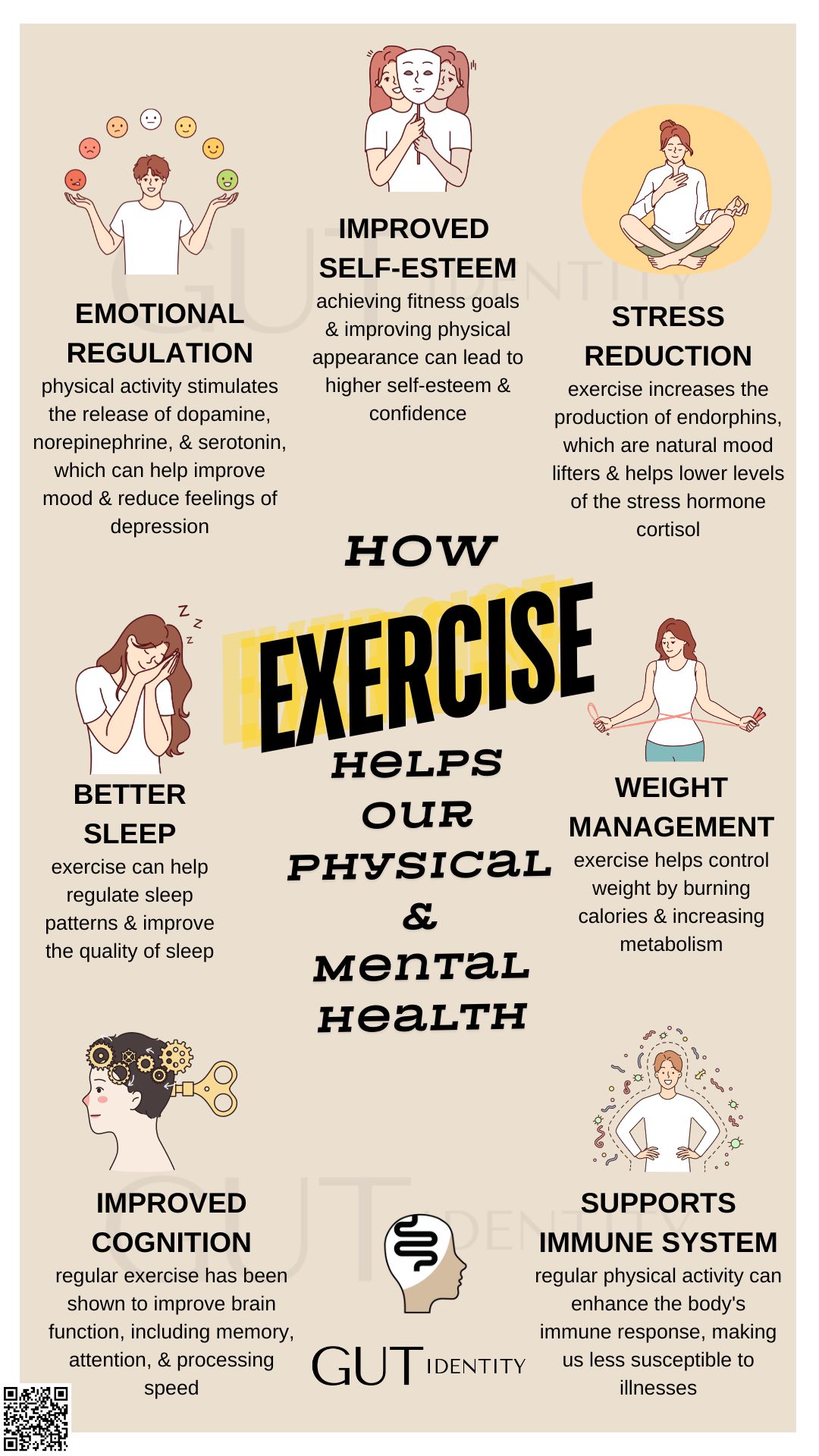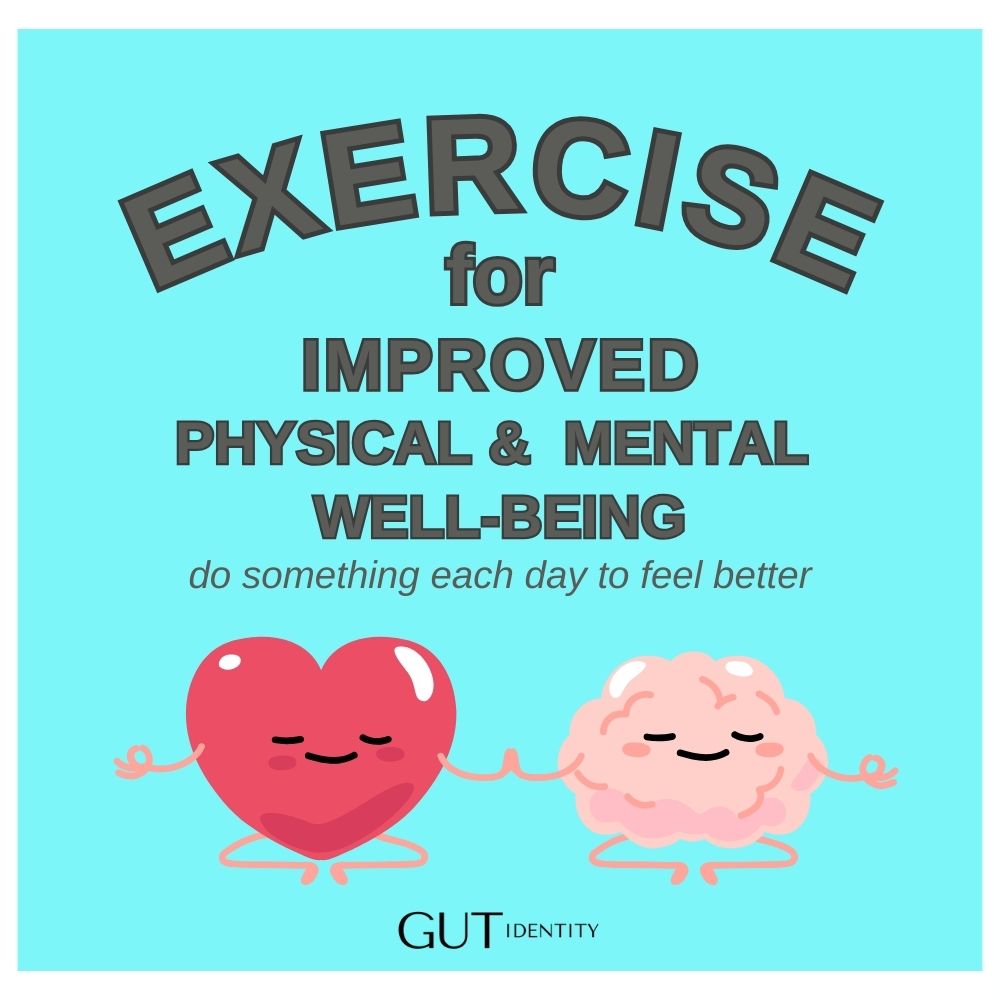Exercise in any form can improve our mental and physical well-being in so many ways. It doesn’t have to be complicated. Just something each day can keep us in good condition and enable us to cope better with what life throws at us. My main purpose for doing regular exercise is to help me regulate my energy and my emotions. Through regular exercise, I’ve managed to down-regulate my internal and external hyperactivity which helps me feel more energised.
Check out some of the ideas in the following graphic as to what exercise can do for our physical and mental health.

exercise for improved self-esteem
Exercise plays a significant role in enhancing how we feel and improving self-esteem by fostering a positive self-image and providing us with a sense of accomplishment. When we do regular physical activity it helps us feel more in control of our bodies and health, leading to increased confidence in our physical abilities.
As we reach fitness goals, whether it’s running a certain distance, lifting heavier weights, or mastering a new yoga pose, we experience a sense of achievement that boosts our self-worth. It makes us feel good!!!! Additionally, exercise can lead to physical changes such as improved muscle tone, weight loss, and better posture, which can enhance how we perceive ourselves and how we believe others perceive us.

The release of endorphins during exercise also contributes to a positive mood, helping to combat feelings of depression and anxiety, further reinforcing healthy and positive self-esteem. Social aspects of exercise, such as participating in group fitness classes or sports, can also provide a sense of community and support, adding to our overall sense of well-being and self-confidence.
exercising for stress reduction

Exercise is a powerful tool for reducing stress and promoting relaxation. Exercise is a natural stress reliever and can help reduce anxiety and tension. When we engage in physical activity, our body releases endorphins, which are natural mood lifters that help us feel more relaxed and happy. Exercise also lowers levels of stress hormones like cortisol, helping to alleviate feelings of anxiety and tension.
The rhythmic nature of activities such as running, swimming, or cycling can have a meditative effect, allowing our mind to focus on the movement and rhythm rather than our worries. Physical activity also improves sleep quality, which is often disrupted by stress, providing further relief. Chronic stress can impair neuronal connectivity, while exercise-induced stress reduction promotes a more conducive environment for neural communication and connectivity.
feeling stressed, do martial arts or boxing

Doing martial arts has been a godsend for me. It’s not only taught me how to defend myself, it’s helped with my physical and mental well-being, kept me fit, and I’ve met some really great friends in the process.
If I’m feeling very stressed, I know the worst thing I can do for myself is sit down and watch Netflix. All this does is prolong my stress and sometimes heighten it. Getting outside and doing some form of physical activity helps me release whatever stress I am feeling by literally shaking it off.
Think of an animal in the wild. If they are in a stressful situation like being hunted and almost caught by a predator, they literally shake it off after escaping the stressful situation and then carry on with their day (to put it simply).
exercise for weight management

I’ve always struggled with my weight in the past. I managed to get this more under control over the past few years by cutting out toxic processed foods but I still need to maintain the good progress I’ve made so far. I’ve changed my lifestyle, not my diet and doing regular exercise is part of this new lifestyle.
Doing daily regular exercise has many advantages for us with weight management being a major one. Exercise helps burn calories, which is essential for creating a calorie deficit necessary for weight loss. The type and intensity of exercise determine how many calories are burned. Cardiovascular exercises like walking, swimming, cycling, and strength training are effective for burning calories.
I do strength training 6 times a week (or at least try to) from home using an app and some basic equipment. It takes me a lot of motivation some days so consistency is key. I like to do it first thing in the morning to get it out of the way and it usually takes around 20-30 minutes. This also sets me up well for the day mentally as I feel I’ve already accomplished something great before I start my day.

Exercise not only helps with weight loss but also with improving body composition by reducing body fat and increasing lean muscle mass. This is important because body composition, rather than just weight on the scales, plays a significant role in overall health. We should also focus on how we feel, and not so much on how we look. Exercise does just that – it helps us feel good.
Next time you start walking to the fridge, head out for a walk. Exercise can help regulate our appetite hormones, leading to better control over our food intake. Exercise may suppress appetite in the short term which can help us develop healthier eating patterns over time.
exercise to support our immune system

Regular exercise is a fantastic way to keep our immune system in top shape. When we work out, our blood circulation improves, helping our immune cells move around our body more efficiently to fight off infections. Activities like walking or biking boost the production of antibodies and T-cells, which are essential for our body’s defence system.
Exercise also helps clear out bacteria from our lungs and airways, making us less likely to catch a cold or other bugs. Plus, it lowers stress hormones that can weaken our immune system if they’re too high for too long. By staying active, we can give your immune system a real boost and stay healthier overall.
exercising for better brain function & cognition

Exercise is not just great for our body, it also works wonders for our brain and cognition. Regular physical activity improves blood flow to the brain, which can enhance our thinking skills, memory, and overall mental sharpness.
Exercise also helps reduce inflammation and insulin resistance, both of which are linked to cognitive decline. Additionally, staying active can improve our mood and reduce stress and anxiety, creating a better environment for our brain to function at its best. By making exercise a regular part of our routine, we can keep our mind sharp and improve our cognitive health. Now, who wouldn’t want that!
Regular exercise has been linked to improvements in executive functioning, which includes skills like organisation, planning, and self-regulation. These are areas where we can struggle especially if under stress, and through exercise, we can help strengthen these cognitive abilities.
Regular exercise can strengthen our cognitive control processes, including inhibition (the ability to suppress irrelevant or distracting stimuli) and cognitive flexibility (the ability to adapt and switch between different tasks or mental sets). These improvements in cognitive control can help us better regulate our focus and attention.
exercising for better sleep

There’s probably nothing worse we could do for ourselves is to sit around all day and then expect to sleep. We need to be moving to release the energy that builds up over the day. Physical activity helps promote relaxation and reduces symptoms of anxiety and depression, all of which can contribute to better sleep patterns.
If you have insomnia like me (although my sleep is near perfect these days), you will understand that some of us can take hours to fall asleep even when we are tired. It is late in the evening when I feel the most awake so for this reason, I don’t do any exercise later in the day except for a walk. I used to do hot yoga in the evening and found that this caused me to have more sleep problems. Of course, we are all different, so it’s a matter of trying different things until you find something that works for you.
exercise helps with emotional regulation

Get ready to ride the endorphin wave! When you get moving, your brain throws a happiness party with those feel-good neurotransmitters. Keeping active not only boosts our mood but also gives a one-two punch to the blues and grumpiness if we’re feeling down for any reason.
By moving on a regular basis, exercise can act as a mood stabiliser and can help reduce any feelings of depression we may have. It also helps reduce feelings of anxiety. Walking, particularly in nature, can have a massive calming effect on us. Nature has a calming effect on the mind and body, helping to reduce stress levels. Natural environments, such as forests, parks, or bodies of water, promote relaxation and provide a respite from the demands and pressures of our daily lives.
If you want to feel better almost instantaneously, head outside to anywhere in nature. You’ll not only keep fit, you’ll feel better in general if you do it regularly.
related post
my top tips for exercise

- do something every day even if it’s a short walk
- train yourself to exercise when you find yourself feeling overwhelmed
- set up playlists for different forms of exercise – this helps with motivation
- walk with either music or listen to a podcast – I often listen to motivational YouTube clips while walking which gives me an extra emotional boost
- Use YouTube for fitness or yoga videos – we have so much free information at the tips of our fingertips these days so make use of it
- get your equipment ready the night before so it makes it easier to follow through on your training in the morning
- join a club or group for fitness – I absolutely love my self-defence classes because I not only keep fit, but I also get to connect with others which makes me feel good
- if you have the funds, enlist the help of a personal trainer. I did this initially and it helped greatly because I learned so much from it and it also helped with staying motivated because I got to see first-hand the great results from it
- if you have other health issues, daily exercise can help. I have osteoarthritis in my knees and doing regular strength training plus walking has helped reduce my symptoms which were debilitating at times
- try to aim for 10,000 steps per day. A 30-minute walk should give you around 4500 steps so if you do an hour, you’re pretty much there
- walk with someone if that helps. If you have children, get them outside too and set an example which will help them establish good habits
- and listen to your body. It tells us when we need to move
bottom line
The vast majority of exercise that we can do can be free. It doesn’t have to be complicated or cost the earth. A simple brisk walk can be done almost anywhere even in a congested city. It’s free and can even be done as past of our commute to work or school.
The most important thing is that we do something each day. We either move it or we lose it!




